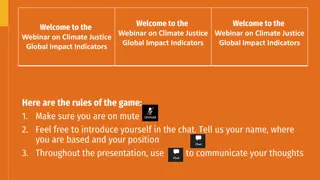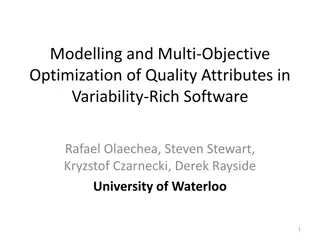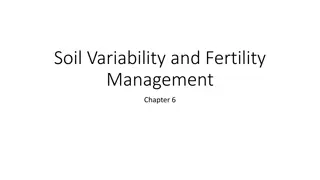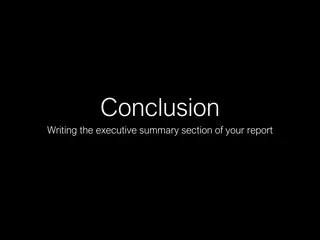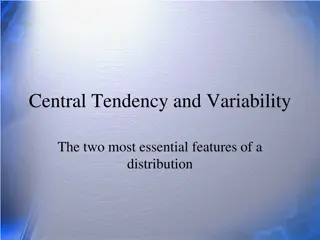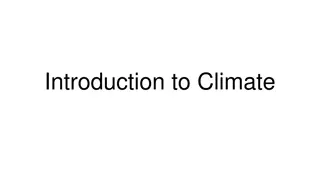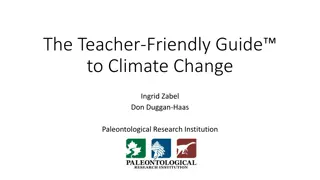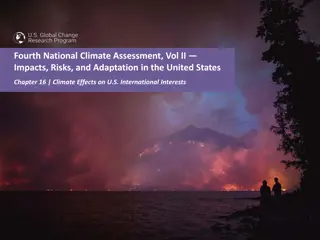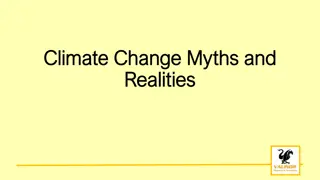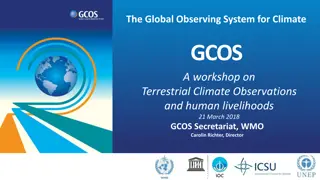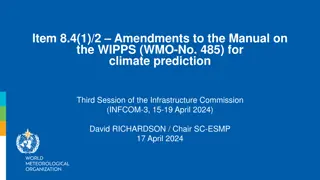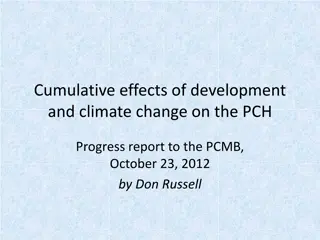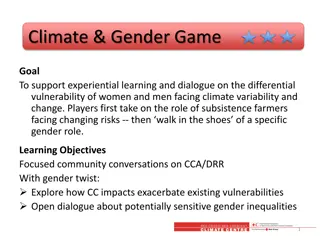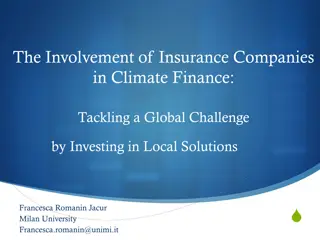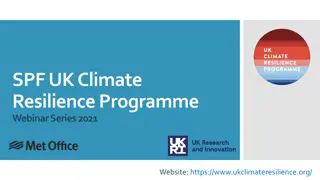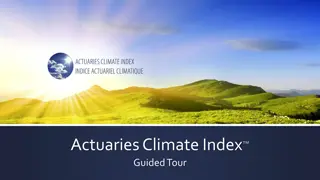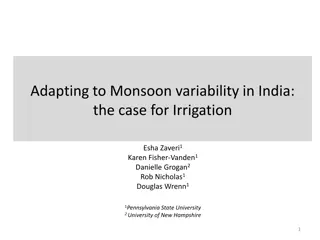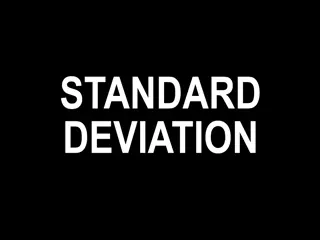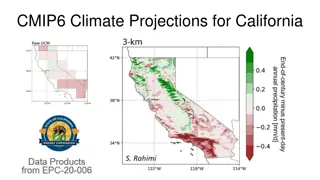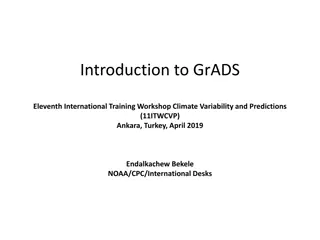An overview of solar influence on climate
The relationship between solar variability and Earth's climate is complex, with factors like the Sun's energy output, 11-year solar cycle, and regional differences playing a role. This overview delves into how solar influences interact with atmospheric and oceanic processes, such as the Sun's impact
6 views • 37 slides
Understanding Climate Change: Weather vs. Climate, Kppen-Geiger Classification, and Major Climate Zones
Explore the distinctions between weather and climate, delve into the Kppen-Geiger Climate Classification System, and discover major climate categories such as tropical climates. Gain insights into climate change and its impact on our environment.
8 views • 11 slides
National Climate Change Bill Overview
The National Climate Change Bill aims to establish an effective response to climate change in South Africa, promoting a transition to a low-carbon, climate-resilient economy. It focuses on coordinated actions, adaptive capacity enhancement, greenhouse gas management, and a fair global contribution.
8 views • 21 slides
Impact of Indian Ocean Dipole on Central Africa Rainfall Variability
Workshop on Indian Ocean Variability and Teleconnections discussed the assessment of the link between Indian Ocean Dipole (IOD) and rainfall variability in Central Africa. The study utilized precipitation data, sea surface temperatures, and dynamic variables to analyze the impact of IOD events on Ce
4 views • 7 slides
Regional Climate Modeling in CORDEX South Asia for Climate Change Research
This information details the regional climate modeling efforts within the CORDEX South Asia framework, focusing on high-resolution dynamical downscaling of CMIP5 climate projections. It highlights the activities, opportunities, and challenges for assessing regional climate change, along with future
4 views • 11 slides
Investment Responses to Biophysical Climate Impacts on Water, Energy, and Land in SDGs and Climate Policies
Investment assessments using Integrated Assessment Models (IAMs) are evolving to include biophysical climate impacts, assessing climate uncertainty on investments. The approach involves the MESSAGEix-GLOBIOM IAM, considering climate policy, SDG measures, and impacts under different scenarios. Climat
6 views • 32 slides
Gender-based Climate Change Litigation: A Key Solution?
Gender-based climate change litigation is emerging as a potential solution to address the disproportionate impact of climate change on different genders. Various international bodies have recognized the importance of integrating a gender-responsive approach in climate action to uphold human rights,
4 views • 12 slides
Gender and Climate Change in Agriculture: Impacts and Adaptation Strategies
This workshop explores the intersection of gender and climate change in agriculture, emphasizing the importance of considering gender dynamics in adaptation planning. It covers the effects of climate change on men and women in agriculture, reasons for gender-sensitive adaptation planning, global and
0 views • 10 slides
Regional Project Proposal to Enhance Climate Resilience in Pakistan, Mongolia, and PRC
This proposal outlines a regional project focusing on enhancing climate resilience and agricultural productivity in Pakistan, Mongolia, and the People's Republic of China (PRC). The project aims to increase access to credit for smallholder farmers, promote climate-smart agriculture technologies, and
0 views • 12 slides
Personal Rights in European Climate Litigation
Climate litigation in Europe focuses on individual rights and the shortcomings of traditional governance mechanisms in addressing climate change. The emergence of climate litigation as a crucial tool in governance is driven by the need to protect individuals and specific groups who are disproportion
0 views • 17 slides
Analyzing Systemic Climate Risk in the Financial Sector
This study discusses systemic climate risk in the financial sector by examining the effects of climate risks on financial institutions. It aims to design a market-based framework to assess the vulnerability of financial institutions to climate risks and analyze potential contagion effects. The frame
0 views • 39 slides
Climate Justice Global Impact Indicators Webinar - June 2023
Explore the Climate Justice Theory of Change, key definitions, impact indicators, and the importance of climate-relevant decision-making in this informative webinar. Gain insights on climate adaptation, resilience, and the effects of climate change, all aimed at empowering marginalized communities t
0 views • 27 slides
Modelling and Optimization of Quality Attributes in Software Variability
Modelling and multi-objective optimization of quality attributes in variability-rich software is crucial for customizing software functionality to meet stakeholders' diverse needs. This involves addressing conflicting quality requirements such as cost, reliability, performance, and binary footprint
0 views • 34 slides
Soil Variability and Fertility Management
Addressing challenges in crop production involves managing soil nutrients, moisture content, and variability. Precision agriculture techniques offer solutions such as site-specific nutrient management and mathematical approaches for matching fertilizer recommendations. This chapter discusses sources
0 views • 72 slides
National Priorities for Climate Change Science and Knowledge in Canada
Canadians are experiencing firsthand the impacts of climate change, including wildfires, heatwaves, floods, hurricanes, and droughts. To address these challenges, foundational climate change science and knowledge are essential for understanding our changing environment, identifying impacts, making i
0 views • 9 slides
Understanding Sampling Variability in Statistical Analysis
Random sampling is crucial in statistical analysis to minimize sampling error. Sampling variability occurs due to chance when a random sample is surveyed instead of the entire population. Different units selected can lead to slightly varied estimates. It's important to understand and address samplin
1 views • 31 slides
Understanding Central Tendency and Variability in Distributions
Central tendency and variability are fundamental features of statistical distributions. Central tendency, encompassing mean, median, and mode, represents the middle of a distribution, while variability describes the spread of data points. Knowing the effect of distribution shape on these measures he
0 views • 25 slides
Understanding Climate and Its Impact on Earth
Exploring the fundamentals of climate, this comprehensive guide covers topics such as climate zones, climate formation, atmospheric composition, the role of CO2, ocean heat absorption, and circulation patterns. From the basics of weather and seasons to the significant impact of climate change, learn
0 views • 12 slides
The Teacher-Friendly Guide to Climate Change
The Teacher-Friendly Guide to Climate Change authored by Ingrid Zabel, Don Duggan-Haas, Robert Ross, and others explores topics such as climate measurement, natural causes of climate change, historical climate perspectives, and more. It delves into the significance of understanding past climates to
1 views • 12 slides
Understanding Population Genetics: Mutations, Variability, and Evolution
Explore the fascinating world of population genetics, covering key concepts like the history of population genetics, mutation types, measurement of variability, and mutation rates. Delve into the diverse mutations such as substitutions, insertions, deletions, and duplications, along with how these v
0 views • 47 slides
Climate Effects on U.S. International Interests: Impacts and Adaptation
The Fourth National Climate Assessment reveals how climate change, variability, and extreme events impact U.S. international interests. This includes effects on the economy, trade, international development, humanitarian assistance, national security, and shared transboundary resources. The report h
0 views • 12 slides
Climate Change Myths and Realities: Debunking Common Misconceptions
This content discusses common myths surrounding climate change and provides evidence-backed realities to debunk them. Topics include the pause in warming, natural climate variability, misconceptions about climate models, the impact of CO2 on plant life, and the consensus among climate scientists. Th
0 views • 6 slides
The Global Observing System for Climate and Terrestrial Climate Observations
The Global Observing System for Climate (GCOS) plays a crucial role in observing climate-related variables globally. Established in April 1992, GCOS focuses on what, how, and where to measure, sustain measurement, manage change, data transmission, management, rescue, and access. It addresses concern
0 views • 17 slides
Amendments to WIPPS Manual for Climate Prediction at INFCOM-3, April 2024
The document discusses amendments to the Manual on WIPPS for climate prediction, including new recommendations for weather, climate, water, and environmental prediction activities. It introduces concepts such as Global Climate Reanalysis and the coordination of multi-model ensembles for sub-seasonal
0 views • 10 slides
Genotypic Variability in Chilli: Colour, Pungency, and Antioxidant Activity
This study explores the genotypic variability in colour, pungency, and antioxidant activity among different chilli genotypes, highlighting the importance of chillies as a major spice crop in India and various other countries. The research aims to analyze the extent of variability in key parameters s
0 views • 31 slides
Climate Change Litigation in Aotearoa/New Zealand: LCANZI Action and Judicial Review
The Lawyers for Climate Action NZ Incorporated (LCANZI) are actively involved in climate change litigation in Aotearoa/New Zealand, including challenging government decisions related to climate responses. A notable case involved a judicial review against Auckland Transport, where the High Court refu
0 views • 6 slides
Understanding Fabrication Variability in Semiconductor Manufacturing
Fabrication variability in semiconductor manufacturing refers to variations in physical characteristics of transistors, impacting their electrical parameters. This variability, whether systematic or random, can lead to performance deviations in digital circuits, affecting power consumption, timing,
0 views • 48 slides
Cumulative Effects of Development and Climate Change on Caribou Population
This progress report by Don Russell on the cumulative effects of development and climate change on the Porcupine Caribou Herd (PCH) discusses findings related to climate analysis, winter range selection behavior, modeling the impacts of climate change and development on caribou body size, energy-pro
0 views • 9 slides
Exploring Variability and Noise in Neural Networks
Understanding the variability of spike trains and sources of variability in neural networks, dissecting if variability is equivalent to noise. Delving into the Poisson model, stochastic spike arrival, and firing, and biological modeling of neural networks. Examining variability in different brain re
0 views • 71 slides
Climate & Gender Game: Experiential Learning on Vulnerability
Engage in the Climate & Gender Game to understand the impacts of climate change on gender roles. Step into the shoes of subsistence farmers facing changing risks and explore the differential vulnerabilities of women and men. Initiate community conversations on Climate Change Adaptation and Disaster
0 views • 10 slides
Understanding Weather and Climate Factors
Weather and climate are essential aspects of understanding the Earth's atmosphere. Weather refers to short-term atmospheric conditions, while climate represents long-term averages over 30 years. Factors influencing climate include distance from the equator, altitude, proximity to the sea, wind direc
0 views • 10 slides
The Role of Insurance Companies in Climate Finance: Addressing Global Challenges through Local Investments
Exploring the engagement of insurance companies in climate finance, this presentation highlights the significance of private sector involvement in tackling climate change at a local level. It delves into key concepts such as mitigation, adaptation, and the global scientific targets for combating cli
0 views • 11 slides
UK Climate Resilience Programme Webinar Series 2021
The UK Climate Resilience Programme is hosting a webinar series featuring experts discussing climate resilience, adaptation strategies, and socio-economic pathways for the UK. Attendees can engage in presentations, Q&A sessions, and access recorded content post-event. Learn about the latest developm
0 views • 10 slides
Understanding the Actuaries Climate Index: A Comprehensive Guide
The Actuaries Climate Index (ACI) is an essential tool that measures climate risks using historical data collected since 1961. It focuses on extreme climate events and sea level changes, providing valuable insights into the impacts of climate change. By analyzing the ACI and its components, users ca
0 views • 18 slides
Deciphering Climate Variability Through Ocean Buoys Data Collection
Ocean buoys like TAO/TRITON provide valuable data on climate variability by measuring various parameters like sea-surface temperature, wind speed, humidity, and subsurface temperatures. Anomalies from normal conditions help identify patterns over time, aiding in understanding climate changes. Mainta
0 views • 5 slides
Adapting to Monsoon Variability in India: The Case for Irrigation
This study explores the impact of monsoon variability on crop irrigation in India using an empirical model. It examines changes in crop irrigated areas in response to monsoon variations, focusing on rice, wheat, and sorghum. The research analyzes crop water needs, sensitivity to drought, and irrigat
0 views • 11 slides
Reactive Clocks with Variability-Tracking Jitter in ICCD 2015
Explore the research on reactive clocks with variability-tracking jitter presented at ICCD 2015. The study delves into the cost of variability margins, timing analysis, clock variability comparison between PLL and reactive clocks, and adaptive frequency utilization. Understand the benefits and impli
0 views • 24 slides
Understanding Standard Deviation and Standard Error of the Means
Standard deviation measures the variability or spread of measurements in a data set, while standard error of the means quantifies the precision of the mean of a set of means from replicated experiments. Variability is indicated by the range of data values, with low standard deviation corresponding t
0 views • 7 slides
Climate Projections and Data Evaluation for California
Detailed information on CMIP6 climate projections for California, evaluation of global climate models, summaries of data on the C-DAWG website, large set of CMIP6 downscaled climate projection data, and improvements in the LOCA2-Hybrid approach. The LOCA2-Hybrid method offers higher resolution train
0 views • 15 slides
Introduction to GrADS Training Workshop on Climate Variability and Predictions
The GrADS Eleventh International Training Workshop on Climate Variability and Predictions held in Ankara, Turkey in April 2019 was conducted by Endalkachew Bekele from NOAA/CPC/International Desks. The workshop covered topics like GrADS tutorial files, Grid Analysis and Display System, and Control/D
0 views • 23 slides











